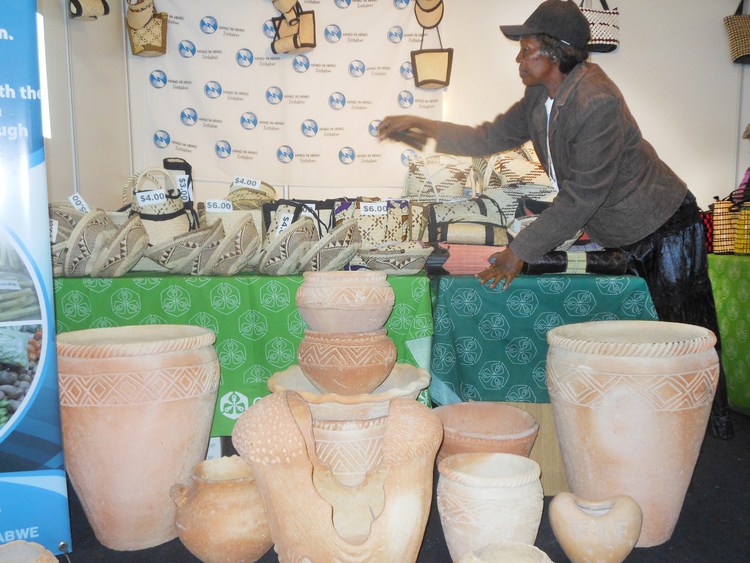
The Sunday Mail

Enacy Mapakame
IN business, as in life in general, it more often than not takes women — usually perceived to be at the bottom of the food chain for social predators — twice as much effort than men to succeed.
And it is rural women who — unlike their urban peers who are always within the scope of public conscience — are vulnerable and need safety nets the most.
Faced with competing national needs, Government’s help, where available, has been limited and restricted only to social welfare.

Mrs Otilia Mbala at a Hand-in-Hand stand with some of the women’s products at the ZITF in Bulawayo recently
Banks, which have increasingly become risk averse, are now only giving out salary-based loans.
But the story of over 50 000 women, most of them from the country’s most driest areas such Gwayi, Nkayi, Bulilima and Lupane in Matabeleland North, including areas such as Chivhu in Mashonaland East, who now earn between US$60 and US$200 monthly, is an inspiring one that highlights the extent to which women can excel if given the right resources and guidance.
Since 2012, Hand in Hand (HiH), an NGO based in South Africa, has been able to give much-needed support to these women.
By imparting skills in entrepreneurship, business management, marketing and basic book keeping, HiH has been able to provide the basic skills set required to launch sustainable business enterprises.
But what has been key to the project, which has been able to provide beneficiaries with stable incomes and decent lives, is the self help group (SHG) model that brings women together in groups of between five and fifteen.
In essence, the SHG mode model inculcates a culture of savings as members pool resources together, share experiences and solve social problems.
It is also viewed as a model that helps instil leadership skills among the once marginalised women as they take turns in holding leadership positions in their groups.
In the last four years, the programme has now grown to cover over 58 063 women.
And from these women, nearly 10 000 small enterprises specialising in various sectors such as agriculture and manufacturing have been formed.
Of the ventures, the most thriving enterprises are poultry, goat rearing, horticulture, crafts, fruits and vegetable merchandising, food processing, horticulture, pottery, basket weaving, dress making, restaurant and retail shops.
Furthermore, the network recently added apiculture (bee keeping), cattle fattening, hair salons, bakeries and fisheries to its business portfolio.
One of the beneficiaries of the programme, Mrs Otilia Mbala, who joined the project in 2015, says she is now financially independent.
Not only is she now able to fend for her family, she has also developed a culture of saving as well, including learning new marketing techniques.
Her income from the crafts she produces for the local and export market has improved from as little as US$10 to between US$100 and US$150.
“My life has improved; I have been empowered through this programme. I now know how to use the resources around me to improve my lifestyle.
“I have been financially empowered by this programme, this year I managed to send my child to boarding school and this is the first time I have done this. I have eight children.
“We are also taught marketing skills, financial discipline and improving quality of products to meet standards required on the export market,” she said.
Mrs Mbala’s products have attracted buyers in Botswana, Zambia and South Africa and prospects for growth were bright.
She also plans to spread the skills to other members of her community.
Ms Shelter Vengesai, another beneficiary, said part of the programme involved members visiting projects in other districts to exchange ideas and gauge the quality of their products and services.
HiH members managed to exhibit at this year’s chapter of the Zimbabwe International Trade Fair.
And Ms Vengesai said it was an eye-opener.
The major international fair created opportunities for growth and networking with regional counterparts from countries like South Africa, Malawi and Zambia.
Linking emerging entrepreneurs with bigger markets is one of the major drawcards of the ZITF, especially for fledgling enterprises.
HiH programme manager Mr Emmanuel Noko told The Sunday Mail Business that the thrust of the organisation was to promote the SHG model as a vehicle for job creation as well as to empower women and youths through capacity building and creation of micro enterprises.
“Rural women are our prime target group. We believe that investing in women’s is investing in the whole society since women’s effort and income is predominately used in providing livelihood options for households and securing household food security,” said Mr Nomo.
“Women work to feed, educate, and care for their families and improve their families. Throughout, we work with local partners who are committed to our model and focused on delivering real change to people’s lives,” he said.
Mr Noko said the SHG model also enables group members to understand the power of shared vision and core values, group support and the importance of savings, lending and financial discipline.
Through internal savings, lending and financial discipline, SHGs members are able to grow a common fund to use as initial investment for their business ideas before any external support is extended to them.
Initial savings can range from US$5 to US$10 per person which group members can lend to each other or use as initial investment capital for their projects.
After demonstrating stability and responsibility, HiH provides training in how to start, grow and sustain a small business.
To this end, the organisation has developed an accredited enterprise development programme and modules that are also aligned to International Labour Organisation start-and-grow-your-business modules.
In addition, the organisation trains members in credit management and offers micro loans, either directly through Enterprise Incubation Fund or through linkages to credible micro finance institutions that offer favourable borrowing conditions to SHGs.
In some instances, HiH links entrepreneurs and group members to financial institutions that offer agro-based loans to farmers.



